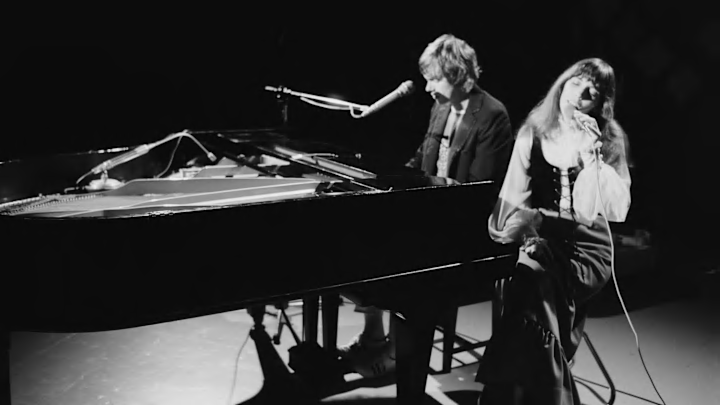Sylvester Stewart – AKA Sly Stone – died this week, and tributes began pouring in from every corner of the musical universe. It was well-deserved. Sly towered over pop music in the late 1960s and early 1970s as few others could.
His influence on funk and soul, and their subsequent impact on hip hop, was monumental. In Questlove’s recently released biopic on Sly’s career, he refers to the artist as a genius. Few would argue.
Sometimes, those geniuses, through no fault of their own, overshadow the hundreds of other gifted artists who add to the musical landscape of an era. Talented men and women who perhaps fall ever-so-short of that G word but still are major players in their day.
Who was Roger Nichols?
Sly had a number one hit in 1970 and again in 1971. In those same years, a young pop composer named Roger Nichols co-wrote a couple of songs that made it to number 2. He may not have been a genius, but I dare say that if you are of a certain age, you can still hum Roger Nichols’ melodies note-for-note more than fifty years after you first heard them.
Roger Nichols passed away a few weeks ago. He was 84 years old. I would have written something about him sooner, but I wasn’t even aware of his death until his obit appeared in the New York Times on Tuesday.
Nichols grew up in Santa Monica and went to UCLA. I haven’t done all the research, but I suspect Roger Nichols is the only man to have played basketball for legendary coach John Wooden and written a song that was recorded by R.E.M.
Of course, neither of those achievements is what Nichols would be known for. During his brief college career, he scored a grand total of two points for the Bruins. And R.E.M.’s version of “Out in the Country” was only released as a B-side and eventually on a collection of rarities.
Still, Nichols had plenty of genuine hits on his resume.
Nichols came from a family of musicians, so after dropping out of UCLA, he began a career as a struggling musician. He put together a group - Roger Nichols and a Small Circle of Friends – and released an album. It didn’t go anywhere, but it did impress several key people with its collection of sophisticated pop melodies.
One of the people who was impressed was Herb Alpert, a major jazz bandleader of the era. Alpert got Nichols a job as a staff songwriter, and by the end of the decade, Roger Nichols had found his career. Around that time, he met a lyricist named Paul Williams, and they began writing songs together.
Their breakthrough came from a most unlikely source. Crocker Bank was a regional business on the West Coast. In 1970, they commissioned a television commercial. A gauzy, soft-focus wedding scene – fresh-faced bride, groom with requisite 1970 sideburns. Friends and family look on, radiating love as the ring is slipped onto the finger. Then the couple sets off in their car to begin their lives together.
“You got a long way to go – We’d like to help you get there – The Crocker Bank” appears on the screen.
And playing over it all was an appropriately dreamy song – “We’ve Only Just Begun.”
Richard Carpenter, the decision-making half of the pop group the Carpenters, saw the commercial and heard a hit. He reached out to Williams. Since the entire commercial was only 60 seconds long, Carpenter wanted to know if there was more to the song. Williams said yes.
(He later admitted that even if they hadn’t written more, he would have lied. Getting recorded by the Carpenters was the kind of break that a couple of young songwriters needed.)
“We’ve Only Just Begun,” now running 3:06 and sung in the angelic voice of Karen Carpenter, was the follow-up to the Carpenters' first number-one song, “(They Long to Be) Close to You.” It reached number two in the USA, only kept from the top spot by the Jackson 5’s glorious “I’ll Be There.”
Nichols and Williams would write several more hits for the Carpenters, including “I Won’t Last a Day Without You,” “Let Me Be the One,” and the goosebump-inspiring “Rainy Days and Mondays,” one of the most gorgeous pop songs of the decade.
Their song “Out in the Country” would be a top 20 hit for Three Dog Night, and as previously mentioned, would later be recorded by Michael Stipe and R.E.M. And as if to prove that he never abandoned the commercial jingle form that helped launch him, Nichols would team up with lyricist Bill Lane for one more famous number that began life as a short promotional song.
In 1975, Kodak commissioned a commercial designed to show how their film could capture and freeze memory. They got MOR crooner Paul Anka to sing the jingle written by Nichols and Lane. Anka sang his part and then decided, as Richard Carpenter had done five years earlier, to look into recording a complete version of the song.
And that is how the song “Times of Your Life” went from commercial jingle to top 20 hit – the second time a Roger Nichols melody managed that feat.
Truth be told, I don’t even like “We’ve Only Just Begun” or “Times of Your Life” all that much. But “Rainy Days and Mondays” and “Out in the Country?” Those are melodic gems from the mind of Roger Nichols.
